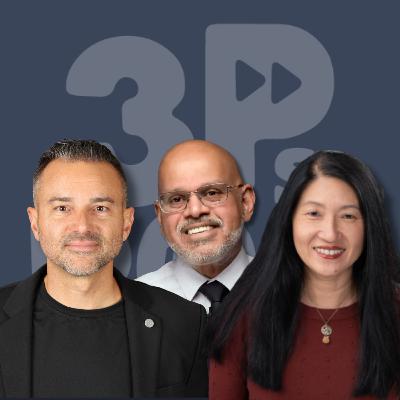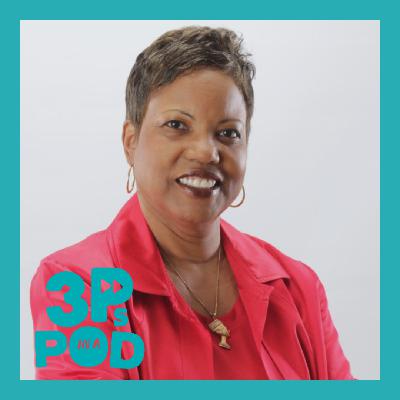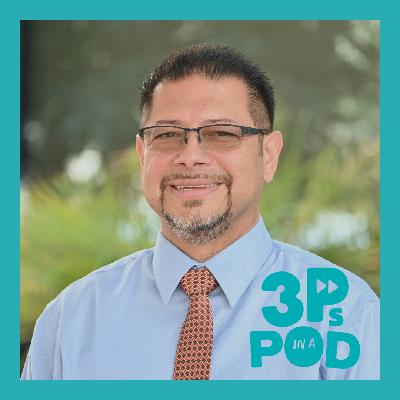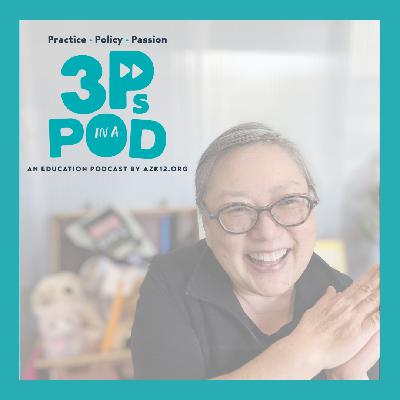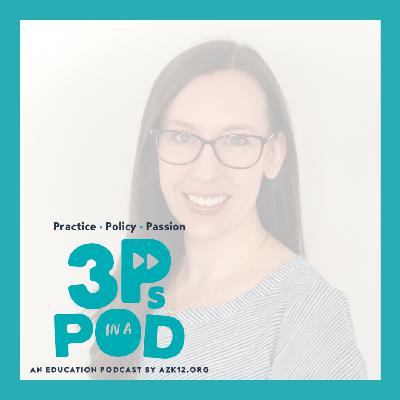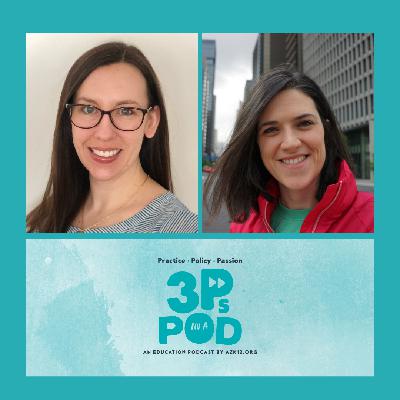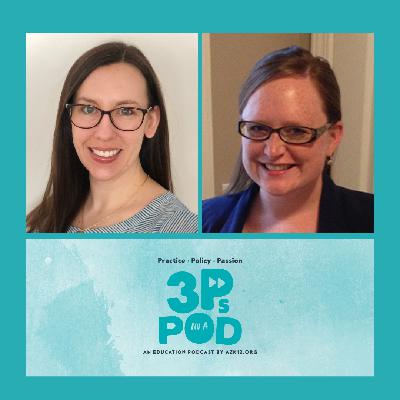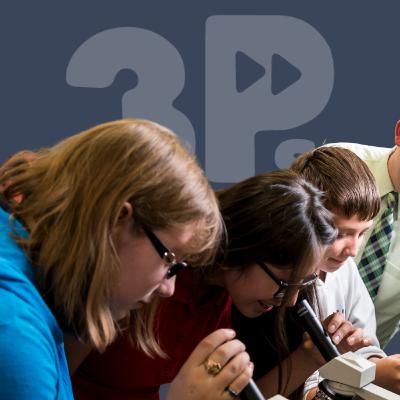Discover 3 Ps in a Pod: An Education Podcast
3 Ps in a Pod: An Education Podcast

3 Ps in a Pod: An Education Podcast
Author: Arizona K12 Center
Subscribed: 27Played: 631Subscribe
Share
Description
Join the conversation about education in Arizona. Featuring educators and leaders from Arizona and far beyond, 3Ps in a Pod explores the practice, policy, and passion of education in our state. You’ll find us discussing classroom management, technology integration, mentoring practices, and much more, all to work toward the best ways to support our students.
231 Episodes
Reverse
Rachel Martinez is in her first year of teaching third-grade in Tolleson Elementary School District. In this episode, 3Ps in a Pod host Kathleen Paulsen talks with Rachel about the support she’s received at her school and the learning she did at the recent Welcome to Teaching event with Dr. Doug Fisher. She shares how struck she was by the six levels of engagement that Dr. Fisher shared and how he showed how even very young students can be aware of their engagement level and know what they need to do to be more ready to learn. She and Kathleen also reflect on the four types of learning: focused instruction, collaboration, guided learning, and independent learning. Rachel shares about the support she’s received in her school and district, including working with a mentor. Rachel’s mentor is Michelle Doherty, who Rachel also had as a professor at Northern Arizona University. Rachel talks about how Michelle supports her and builds her confidence as she goes through her first year of teaching. As Rachel nears the end of her first school year, she says she’s excited to reflect and see the growth that both she and her students made during the year. She notes how important it is for her to reflect on her work and growth for herself but also to model the expectation and power of that for her students. The Arizona K12 Center is also having Dr. Fisher back for another event based on his book Welcome to Teaching this fall! You can learn about and register for that event at azk12.org/24BTS2. Learn more about the Arizona K12 Center at azk12.org.
In this second part of our four-part series on AI in Education, guest host Dr. Chad Gestson asks the question that is on many educators’ minds: “Is AI cheating?” He and Dr. LeeAnn Lindsey talk to Dr. Punya Mishra about academic and professional integrity, and why AI should be a catalyst to rethink “plagiarism” and “cheating." Dr. Gestson and Dr. Lindsey are both a part of the Arizona Institute for Education and the Economy, a part of Northern Arizona University, while Dr. Mishra is associate dean of scholarship and innovation and professor in the Mary Lou Fulton Teachers College at Arizona State University. Dr. Mishra broadens the conversation to talk about what cheating is in general and how we approach assessment. The discussion about AI and cheating is an opportunity to talk deeply about how we evaluate learning, he shares. That connects to a larger conversation about the purpose of the preK-12 education system, he explains. The three also talk about the role of agency and autonomy in learning. They also discuss the need for a class like the Theory of Knowledge class that is a part of the International Bacalaureate program for students to better understand the creation and sharing of ideas. Learn more about he Arizona K12 Center at azk12.org.
When Dr. Jennifer Robinson first attended the Arizona K12 Center’s annual Teacher Leadership Institute, she was the only one from her district but connected with other “lone wolves.” She learned there but has since found even more value in bringing a team to this annual summer conference. She shares with 3Ps host Paula about how she brings a variety of personnel from her school with her to Teacher Leadership Institute and how they synthesize their learning together and also share with the rest of their school together. Dr. Robinson reflects on the power of stepping away from the usual routine and connecting with other districts and those outside of education to transform your thinking about your work. Learn more about this year’s 19th Annual Teacher Leadership Institute at azk12.org/TLI. Learn more about the Arizona K12 Center at azk12.org.
Julia King Pool joined us last season to talk about the psychology behind the concept of burning in rather than burning out. In this episode, she continues that conversation by sharing specific strategies for approaching some difficult scenarios you might have encountered. Hosts Juliana and Marlys ask Julia several questions about stressful scenarios educators often find themselves in. These include difficult conversations with a student’s parent, balancing creativity and autonomy with a scripted curriculum, and not feeling supported at school. Julia provides research-backed steps for these situations and also talks through strategies to help educators’ wellbeing all around. She references Sabine Sonnentag’s work around recovering from the workday in talking about how educators can work toward balance. Sonnentag outlines four aspects to help recover from a workday, including psychological detachment, relaxation, mastery experiences, and control. Julia talks with Juliana and Marlys about the variety of ways those might look for an individual. This episode also references this RAND research report and also Yuval Noah Harari, author of Sapiens: A Brief History of Humankind. Learn more about Julia King Pool’s work at BurninMindset.com or by connecting with her on LinkedIn. Learn more about the Arizona K12 Center at azk12.org.
If you’re a teacher, you’re a dendrite grower, according to today’s guest Dr. Marcia Tate. Growing dendrites is a piece of brain science Dr. Tate shares in many of her books and workshops to help educators understand the context of brain-based teaching and learning. Dr. Tate talks with 3Ps host Josh about how, after years working as a teacher and an administrator, she learned about the brain science behind teaching and wanted to share that understanding with others. She has now been in education 49 years and has taught about half of million people as an educational consultant. Along with other tips and snippets about brain-based teaching, Dr. Tate shares a few of her favorite strategies, including incorporating movement and music, into the classroom. Josh also invites Dr. Tate to share about her most recent book, Happy Teachers, Happy Classrooms, which she wrote during the COVID-19 pandemic. This book addresses how to avoid burnout and increase teacher health and wellness. Dr. Tate has been facilitating the Arizona K12 Center’s events for beginning teachers through this school year and will also be the lead facilitator at this summer’s Beginning Teacher Institute. Learn more about the 4th Annual Beginning Teacher Institute: Great Minds Don’t Think Alike at azk12.org/BTI24. Learn more about Dr. Marcia Tate’s work at developingmindsinc.com. Learn more about the Arizona K12 Center at azk12.org.
You may know the Arizona Educational Foundation or AEF as the home of the Arizona Teacher of the Year program and the Arizona State Spelling Bee. In this episode, you’ll hear from Kim Graham, CEO of AEF, about the work of the Foundation and how she approaches her work leading these efforts. Kim shares how she moved from studying theater to teaching high school English to working in arts education to leading the Arizona Educational Foundation. She shares with Daniela about the specific programs AEF hosts but also the intention behind all of that work. Kim explains how AEF’s offerings “primarily provide a stepping stone toward excellence for educators, administrators, and students. Or, they shine a spotlight on the great work being done in schools or by educators and administrators.” On a more personal level, Kim shares about what brings her joy through her work with AEF and how she attempts to recharge to be able to continue the work of the Foundation. Learn more and follow AEF’s work with these links: AEF’s website 2023 AEF Annual Impact Report AEF Donors AEF’s Facebook page, Instagram page, X (formerly known as Twitter) page, and LinkedIn page Learn more about the Arizona K12 Center at azk12.org.
Here at the Arizona K12 Center, we’re big proponents of reflecting on your practice. But what does it mean to be a reflective practitioner and how do we use that reflection to not be the end goal but a tool to generate change in ourselves and our learners? Dr. Kevin Roessger, associate professor of adult and lifelong learning at the University of Arkansas, has focused his work in quantitative research methodologies and adult learning theory. In this episode, he talks with host Paula about what led to this interest and the research he has done in critical reflection or reflective practice. Dr. Roessger emphasizes how reflection is often thought of as the end goal when that is truly a tool in the process of continued growth. He shares about what reflection truly is – our “remembering self” retelling and framing the experiences of our “experiencing self.” In this episode, Paula also references her conversations with The Learning Scientists in previous episodes of 3Ps in a Pod. Dr. Roessger also mentions a recently published article in the Adult Learning journal, “Assessment Strategies for Reflective Learning in the Workplace: A Pragmatic Approach.” Learn more about the Arizona K12 Center at azk12.org.
Efrain Casillas, the 2024 Arizona Teacher of the Year, has been teaching at Tolleson Elementary School District for 17 years. His vision isn’t to just teach music to his current students but to build a culture of music in Phoenix. 3Ps hosts Josh and Donnie talk with Efrain about the beginning of his interest in music as a child in Puerto Rico and how that led to his music education career. Efrain shares how he works to engage his students’ interests and culture into his teaching. That’s led to his creating multiple new music groups, including mariachi, jazz, marching, concert, and Latin jazz bands, at Tolleson Elementary schools. He notes the amount of recognition the mariachi band has gone on to earn as well. Having those bands compete in music contests and play publicly in the community has provided students with skills they wouldn’t learn only playing in school and also opened the door for more community engagement. Efrain has been able to fundraise and further expand music programming and engage more Tolleson students. He also mentions how he’s interested in beginning a community band for former students and others who would like to continue playing their instruments. Learn more about Efrain Casillas and glimpse into his classroom at azedfoundation.org. Learn more about the Arizona K12 Center at azk12.org.
Explore the world of Cognitive Coaching — a transformative approach unlocking minds and elevating problem-solving skills — in this episode of 3Ps in a Pod with educators and facilitators Taryl Hansen, NBCT, and Mary Bouley. Taryl and Mary talk about the history of Cognitive Coaching and give an overview of this approach to coaching that mediates thinking and prioritizes teacher autonomy. They make it clear that Cognitive Coaching is one of multiple coaching tools to be used in particular situations but not all. The pair also address misconceptions or assumptions some people have about Cognitive Coaching. Some of those misconceptions include the ideas that educators don’t actually have time to coach in this way or that Cognitive Coaching is only suited for more advanced educators. Together with 3Ps host Kathleen, who has also completed both Cognitive Coaching Foundations and the Advanced Seminar, they reflect on their own experiences with this coaching style. Find upcoming Cognitive Coaching events at azk12.org/events. Register early, as these events consistently fill up. Learn more about the Arizona K12 Center at azk12.org.
You know how challenging teaching can be and how many teachers today encounter burnout. That’s why Julia King Pool founded the Burn-in Mindset, a coaching program for experienced educators that mitigates burnout and cultivates energy, optimism, and confidence. Julia shares with hosts Juliana and Marlys how she founded Burn-in Mindset and how it is based in the tenets of positive psychology. Positive psychology is the scientific study of the strengths that enable individuals and communities to thrive. She also shares some specific mindset shifts and strategies to help teachers feel more balanced. As educators are more able to “burn in” using positive psychology, the more they are able to support others in burning in as well. Learn more about the Burn-in Mindset at burninmindset.com or by emailing Julia at Julia@burninmindset.com. Learn more about the Arizona K12 Center at azk12.org.
Today, we welcome back Chris Kotterman, the Director of Government Relations for the Arizona School Boards Association, to discuss the past Arizona legislative session, significant bills that did and didn’t make it into state policy, and what might be coming in the 2024 session. Kotterman notes that fewer bills than usual affecting education will take effect this year due to several vetoes by Governor Katie Hobbs but does share with hosts Donnie and Juliana about HB2460, which relates to the suspension of students in grades K-4. He then talks through several bills that did not pass in the 2023 session but that may arise in future sessions. He specifically clarifies Arizona Revised Statute 15-117, which talks about parental permission for particular surveys for students, and clarifies how districts are approaching those regulations. Kotterman also mentions a finance bill that may arise in the next session and makes some predictions about other bills and discussions that will return to the Arizona Capitol next session, which kicks off in January 2024. Visit apps.azleg.gov to check on bill updates, and visit azsba.org to find the Arizona School Board Association’s legislative updates. Learn more about the Arizona K12 Center at azk12.org.
This is a replay of an episode from September 2022. In recognition of National Day of Remembrance for U.S. Indian Boarding Schools on September 30, we are discussing the history of American Indian boarding schools and the continued legacy of this part of our history. Hosts Daniela and Donnie welcome Marcus Monenerkit from the Heard Museum to the podcast to speak about the history of American Indian boarding schools and the Away From Home: American Indian Boarding School Stories exhibit at the Heard Museum. Monenerkit shares about what students and families experienced, including a bit of his own family’s experiences and about the American Indian boarding schools now present on Steele Indian School Park in central Phoenix. He speaks to the trauma and challenges students and their families faced and how that continues to affect American Indian individuals and families today. He also details some of the policy and mindsets that led to the creation of American Indian boarding schools, how they changed over time, and what current-day American Indian boarding schools are like today. Here are a few resources connected to today’s discussion: Away From Home: American Indian Boarding School Stories exhibit at the Heard Museum Video about the history of American Indian Boarding Schools from the Heard Museum Statement by U.S. Department of the Interior Secretary Deb Haaland on the Truth and Healing Commission on Indian Boarding School Policies Act Learn more about the Arizona K12 Center at azk12.org.
In January of 2023, Dr. Dani Portillo became the superintendent of Roosevelt School District, the first Latina to hold this position. In today’s episode, Dr. Portillo talks with hosts Kathleen and Josh about her journey into education and her vision for Roosevelt School District, an elementary district in south Phoenix. Roosevelt, an elementary district in south Phoenix, currently serves about 7,400-some students and employs about 1,400 people. Dr. Portillo shares the importance of this mid-size district to south Phoenix, including the teaching of students but also the impact on housing values and community development. She shares about her vision for the district and how integral Roosevelt schools are to advancing the south Phoenix community. Dr. Portillo shares about both the challenges and what she most enjoys in her new role, especially working with adults for the benefit of all students. She also shares about what she enjoys in her free time, including suspenseful movies and gardening. She also recommends a recent book she’s appreciated, Radical Candor by Kim Scott. Dr. Portillo also shares about how her parents have influenced her approach to education and the work ahead of her. Learn more about Dr. Portillo and Roosevelt School District at rsd66.org. Learn more about the Arizona K12 Center at azk12.org.
Janet Wong left a law career and dove into writing poetry and helping others see the power of poetry. In this episode of 3Ps in a Pod, Janet talks with hosts Josh and Juliana about her approach to poetry and shares a variety of ways you can use poetry in your classroom. Janet shares how poems can be used as a way to get to know your students, as a brain break, as a way to teach revision, and to practice being creative. She reads several poems in this episode, including from this past summer’s Beginning Teachers Institute, where she was a keynote speaker and had participants write multiple poems. Janet Wong is the 2021 winner of the NCTE Excellence in Poetry for Children award, a lifetime achievement award that is one of the highest honors a children’s poet can receive. Wong is the author of more than 40 books for children and teens on a wide variety of subjects, including writing and revision (You Have to Write), diversity and community (Apple Pie 4th of July), peer pressure (Me and Rolly Maloo), chess (Alex and the Wednesday Chess Club), and yoga (Twist: Yoga Poems). She also serves on the Yale Law School Executive Committee. You can find Janet on X, previously Twitter, at @janetwongauthor and through her websites, janet-wong.com and pomelobooks.com. Learn more about the Arizona K12 Center at azk12.org.
In this final episode of our series with The Learning Scientists, Dr. Megan Sumeracki dives into more detail about the three teaching and learning strategies of elaboration, concrete examples, and dual coding. The Learning Scientists, a group of cognitive psychologists, have developed six main strategies to support your teaching and your students’ learning. In the previous episode, Dr. Sumeracki and Dr. Althea Need Kaminske talked about the strategies of spaced practice, interleaving, and retrieval practice. Today, Dr. Sumeracki talks in-depth about the remaining three strategies: Elaboration, connecting new learning to previous learning Concrete examples, providing supporting information Dual coding, using visuals A synopsis of these strategies and resources to help use them is at this link and you can find the full research paper at this link. Learn more about The Learning Scientists at learningscientists.org and learn more about the Arizona K12 Center at azk12.org.
In the last three episodes, we’ve explored some different aspects of the cognitive psychology behind how we learn. Today, we’re taking that context and applying it to six strategies to support your teaching and your students’ learning. In this episode, Dr. Althea Need Kaminske and Dr. Megan Sumeracki, two of The Learning Scientists, begin talking about these six strategies: Spaced practice, repetition spaced out over time Interleaving, interspersing different topics in a lesson Retrieval practice, working at accessing memory Elaboration, connecting new learning to previous learning Concrete examples, providing supporting information Dual coding, using visuals A synopsis of these strategies and resources to help use them is at this link and you can find the full research paper at this link. They dive in more deeply with hosts Josh and Paula about spaced practice, interleaving, and retrieval practice and will further explore elaboration, concrete examples, and dual coding in next week’s final episode of this series. Learn more about The Learning Scientists at learningscientists.org and learn more about the Arizona K12 Center at azk12.org.
We continue our series with The Learning Scientists on this episode of 3Ps in a Pod. Today, hosts Josh and Paula talk with Dr. Althea Need Kaminske and Dr. Megan Sumeracki about working memory and perception. Dr. Sumeracki and Dr. Kaminske give multiple examples demonstrating how background knowledge shapes your perception and what that means for how we communicate or give instructions to students or anyone else in our lives. The Learning Scientists also discuss the processes of moving from learning to applying concepts and what that looks like for both students and for pre-service teachers moving into the day-to-day of teaching. They then discuss what it is to pay attention, how that connects with short-term and long-term memory, and how mind wandering can actually be helpful in learning and creating memory. The group also begins to talk about strategies that truly support how cognition actually works. Dr. Kaminske talks specifically about note-taking and how quality note-taking that supports actual learning requires a slowed down lecture, for example, or taking the time when reading a textbook to not just rewrite statements but to process and structure the information in their own way. They also discuss the idea of active learning. In the next episode, Dr. Sumeracki and Dr. Kaminske build off of this conversation and discuss more strategies and interventions you can apply that support the cognitive processes discussed in this episode. Learn more about the Learning Scientists at learningscientists.org, and learn more about the Arizona K12 Center at azk12.org.
We’re back with part two of our series with The Learning Scientists! Today, cognitive psychologists Dr. Megan Sumeracki and Dr. Cindy Nebel pick up where we left off in the first part of this series. They jump into a demonstration with hosts Josh and Paula that illustrates some aspects of how our brains work. That leads into a discussion about why it’s cognitively so important to understand your students’ contexts in learning. Paula also asks Dr. Sumeracki and Dr. Nebel to discuss what it means to use research-based curriculum and why we need to depend on research rather than our intuition when it comes to teaching. They also discuss the benefits and uses of interleaving versus blocking content. Here are links to the resources mentioned in this episode: The Bransford and Johnson research on “Contextual Prerequisites for Understanding: Some Investigations of Comprehension and Recall” The Rohrer and Taylor research on “The shuffling of mathematics problems improves learning” The Learning Scientists’ Downloadable Materials: Ace That Test: A Student’s Guide to Learning Better by Drs. Megan Sumeracki, Cynthia Nebel, Carolina Kuepper-Tetzel, and Althea Need Kaminske Understanding How We Learn: A Visual Guide by Dr. Yana Weinstein (Jude Weinstein-Jones) and Dr. Megan Sumeracki Five Learning, Teaching Myths Debunked by Adam M. Brown and Althea Need Kaminske Learn more about the Arizona K12 Center at azk12.org.
We’re starting off a five-part series with The Learning Scientists, a group of cognitive psychological scientists focused on how we learn. Today, hosts Josh and Paula talk with Dr. Megan Sumeracki and Dr. Cindy Nebel about the science of learning. As cognitive psychological scientists, The Learning Scientists are a group interested in research on education, specifically on the science of learning. They aim to motivate students to study by increasing the use of effective study and teaching strategies backed by research and decreasing negative views of testing. Dr. Sumeracki and Dr. Nebel share more about what that means and the differences between their area of study and that of neuroscientists. They detail why it’s so important for educators to know some cognitive psychology to better understand students’ needs when learning. Hosts Josh and Paula then share some of the misconceptions that struck them when they read Understanding How We Learn, A Visual Guide and discuss them with The Learning Scientists. The Learning Scientists and hosts Josh and Paula will continue their conversation in next week’s episode of 3Ps in a Pod. Learn more about The Learning Scientists at learningscientists.org, and learn more about the Arizona K12 Center at azk12.org.
STEM education can look very different across Arizona, which is why the Arizona STEM Acceleration Project came to be to help advance STEM in schools across the state. In this episode, hosts Donnie and Daniela talk with Mike Vargas and Amanda Whitehurst share how the Arizona STEM Acceleration Project (ASAP) works to transform how educators deliver STEM education. The Arizona STEM Acceleration Project has three components for the program’s teacher fellows: overseeing a student- or community-facing project writing four STEM lesson plans taking part in research on teaching STEM in Arizona ASAP has completed its first year and is embarking on its second. In it’s first year, 433 fellows in about 300 different schools completed the program, affecting almost 90,000 students. About 90% of fellows who started ASAP completed and were able to energize STEM education in their classroom. The fellows represented every county, every major city, and most reservations in Arizona. Those fellows completed almost 15,000 hours of professional development and created 1,771 STEM lesson plans that are now in this online lesson plan archive that is free and open for all Arizona teachers. These lesson plans are all specific to STEM and the Arizona State Standards. ASAP also provided about $850,000-worth of classroom equipment and paid $2 million in stipends to the teacher fellows. In this episode, Amanda also shares examples of how ASAP fellows’ projects have directly impacted students and their future goals. You can find more of those stories on the ASAP website’s fellow highlight section. ASAP is also partnering with the Arizona K12 Center to introduce a National Board Certification STEM cohort for teachers interested in pursuing National Board Certification alongside other STEM educators. Read more about that opportunity here, and contact Donnie Dicus at ddicus@azk12.orgto join. Learn more about the Arizona K12 Center at azk12.org.


